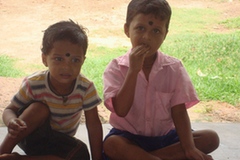When POSHAN was first launched, POSHAN conducted a number of reviews to understand the landscape of policies, stakeholders, and available evidence in nutrition in India. The findings from this inception phase research are featured in the series of Research Notes featured below.
 Research Note No. 1. An Overview of the Nutrition Knowledge Systems and Networks in India
Research Note No. 1. An Overview of the Nutrition Knowledge Systems and Networks in India
A team from POSHAN analyzed virtual and physical knowledge networks on nutrition in India. The review yielded very few physical or virtual networks in the country. Those that do exist operate only in English and at the national level.
The new Nutrition Resource Platform, launched by the Ministry of Women and Child Development, has the potential to fill important gaps raised in our review of knowledge systems.
 Research Note 2. A Review of Evidence-Based Interventions in Indian Nutrition Programs
Research Note 2. A Review of Evidence-Based Interventions in Indian Nutrition Programs
A team from POSHAN reviewed components of over 22 nutrition programs in India to assess the extent to which these programs address the 14 essential nutrition inputs to improve maternal and child nutrition, as outlined by Bhutta et al. (2013) in The Lancet and others. The team found that the Integrated Child Development Services and the National Rural Health Mission programs together incorporate all of the 14 essential inputs in their designs. However, a majority of NGO-led programs do not. The review showed that there is an overwhelming need to build evidence on how best to deliver high-quality interventions.
 Research Note 3. Mapping exercise shows the most influential stakeholders in Indian nutrition
Research Note 3. Mapping exercise shows the most influential stakeholders in Indian nutrition
Researchers from POSHAN mapped the nutrition stakeholders in India to assess which ones have the most influence on nutrition in India. The exercise revealed a highly complex, centralized landscape of actors with the Ministry of Health and Family Welfare, the Ministry of Women and Child Development, and the Planning Commission holding the most influential positions in the network. These two ministries, along with the Planning Commission, are seen as opinion leaders and key decision-makers in the national network.



